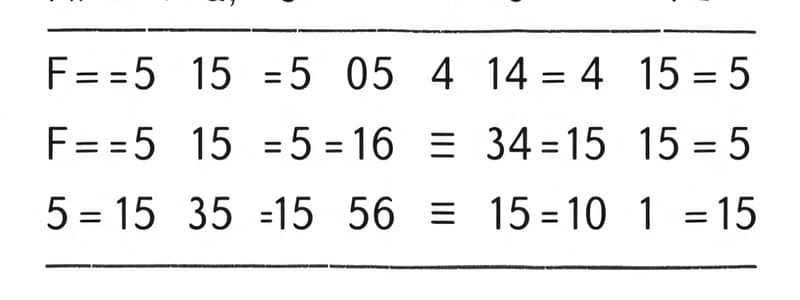Podcast
Questions and Answers
What is the lowest common multiple (LCM) of 4 and 6?
What is the lowest common multiple (LCM) of 4 and 6?
- 10
- 12 (correct)
- 6
- 24
If the mean of the scores 10, 15, 20, and X is 18, what is X?
If the mean of the scores 10, 15, 20, and X is 18, what is X?
- 20
- 30
- 25 (correct)
- 15
Which of the following is a factor of 36?
Which of the following is a factor of 36?
- 15
- 8
- 9 (correct)
- 12 (correct)
If you want to compare the fractions $\frac{3}{4}$ and $\frac{5}{8}$, which is larger?
If you want to compare the fractions $\frac{3}{4}$ and $\frac{5}{8}$, which is larger?
How many scores are included if the total score is 120 and the mean of the scores is 30?
How many scores are included if the total score is 120 and the mean of the scores is 30?
Flashcards are hidden until you start studying
Study Notes
Basic Operations
- Addition is combining two or more numbers to find their sum.
- Subtraction is finding the difference between two numbers.
- Multiplication is repeated addition of a number by itself.
- Division is splitting a number into equal parts.
Factors
- Factors are numbers that divide exactly into another number without leaving a remainder.
- Example: The factors of 12 are 1, 2, 3, 4, 6 and 12.
Lowest Common Multiple
- Lowest Common Multiple (LCM) is the smallest number that is a multiple of two or more numbers.
- Example: The LCM of 4 and 6 is 12.
Highest Common Factor
- Highest Common Factor (HCF) is the largest number that is a factor of two or more numbers.
- Example: The HCF of 12 and 18 is 6.
Ordering Fractions
- Fractions can be ordered from smallest to largest by comparing their numerators and denominators.
- Example: To order 1/2, 1/4 and 3/4, first compare the denominators. 1/4 and 3/4 have the same denominator, so we compare their numerators. Hence, the order is 1/4, 1/2, 3/4.
Comparing Fractions
- Fractions can be compared by finding a common denominator or using cross-multiplication.
- Example: To compare 2/3 and 3/4, we can find a common denominator of 12: 2/3 = 8/12 and 3/4 = 9/12. Hence, 3/4 is greater than 2/3 because 9/12 is greater than 8/12.
Mean
- Mean is the average of a set of numbers.
- To find the mean, we add up all the numbers in the set and then divide by the number of numbers in the set.
- Example: If the scores are 5, 7, 8, and 10, the mean is (5 + 7 + 8 + 10) / 4 = 7.5.
Finding the Missing Number
- If we know the mean and three out of four scores, we can calculate the missing score.
- Example: If the mean is 7.5, and the scores are 5, 7, and 8, the missing score is (7.5 x 4) - 5 - 7 - 8 = 10.
Finding the Number of Scores
- If we know the total score and the mean, we can calculate the number of scores.
- Example: If the total score is 30 and the mean is 6, the number of scores is 30 / 6 = 5.
Studying That Suits You
Use AI to generate personalized quizzes and flashcards to suit your learning preferences.




